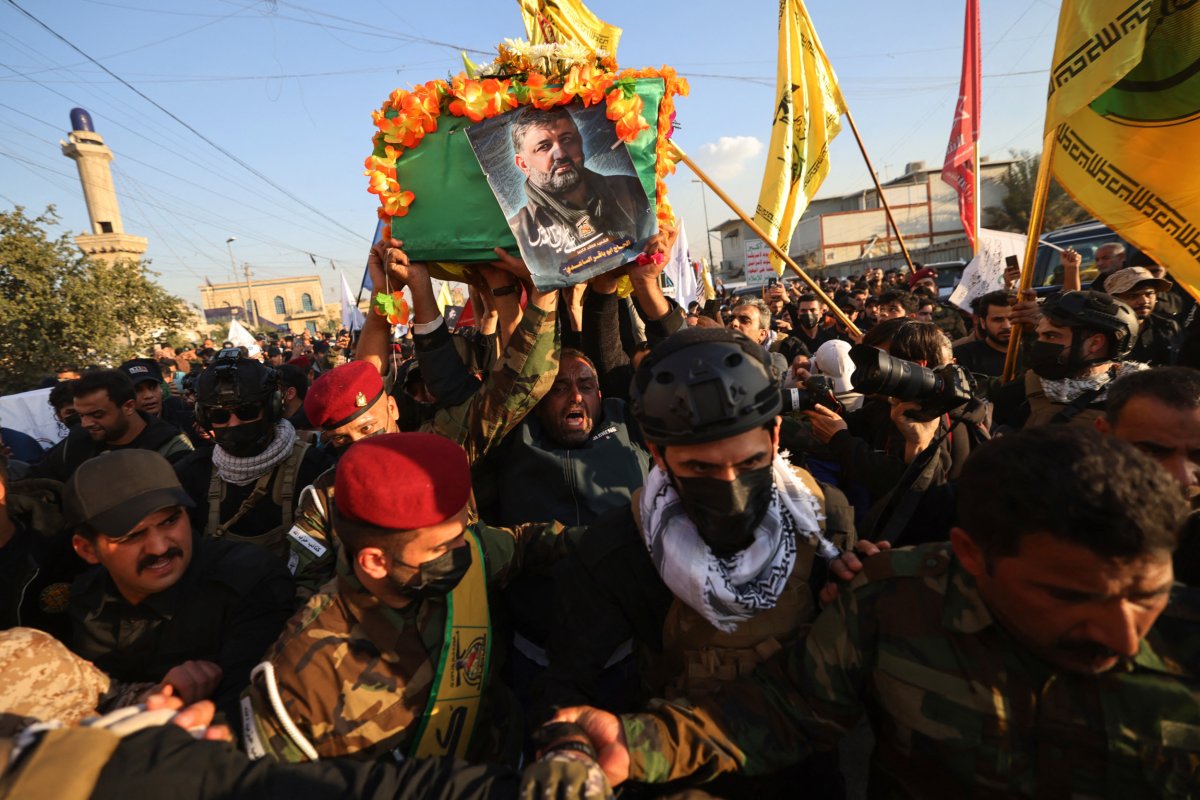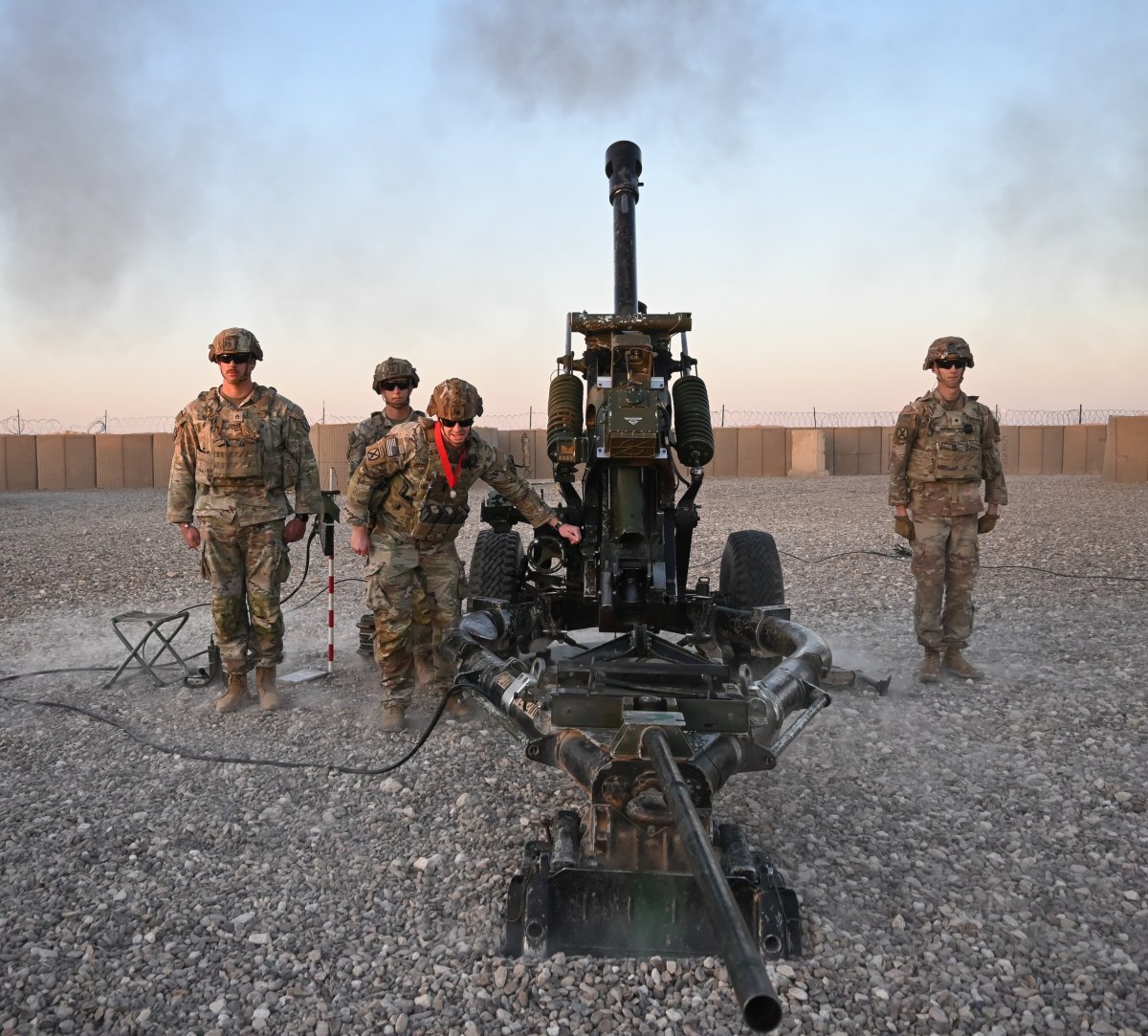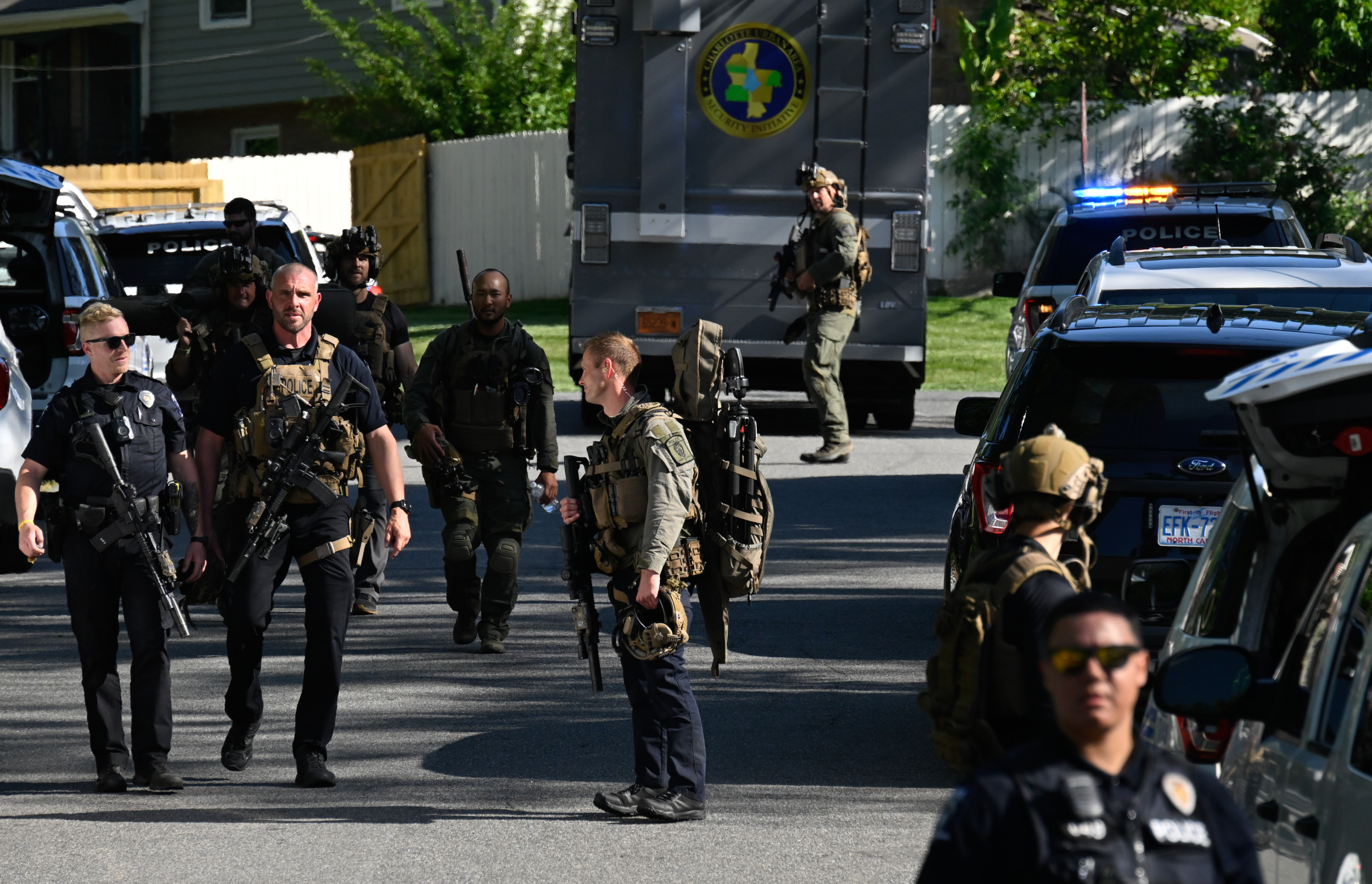An Iraqi militia participating in the coalition of groups targeted by U.S. strikes over their ongoing campaign to expel U.S. troops from the country by force shared with Newsweek a new warning to the United States amid a worsening cycle of violence.
Days after the latest operation in which U.S. President Joe Biden ordered a drone strike that killed at least one senior official of the Kataib Hezbollah militia, a representative of fellow Islamic Resistance in Iraq coalition member group Ashab al-Kahf told Newsweek that "the military response will be at the right place and at the right time."
The Ashab al-Kahf representative referenced two powerful figures who command influence in Iraqi politics and preside over their own armed factions, Asaib Ahl al-Haq and the Badr Organization, respectively.
"Sheikh Qais al-Khazali and Haj Hadi al-Amiri promised us to demand pressure for the occupier to leave as soon as possible," the Ashab al-Kahf representative said.
As for Ashab al-Kahf, the representative of the group said that "it is always prepared for all possibilities and does not base its movements according to immediate circumstances only, but rather according to every possible future development, including the possibility of a major escalation by the American occupation."
When that happens, the Ashab al-Kahf representative warned that "the response is completely ready" and "we will inevitably face fire with fire."

Ashab al-Kahf is part of a broad network of Iraqi Shiite Muslim militias opposed to rival Sunni Muslim insurgents as well as U.S. military forces. Its name, which translates to "Companions of the Cave," is a reference to a centuries-old story found in Christian writing and the Quran about a group of monotheistic youths who hid in a cave to escape religious persecution.
The group's origins are murkier than those of some of the more well-known outfits such as Kataib Hezbollah, Asaib Ahl-Haq, the Badr Organization and the Nujaba Movement.
These militias were established in the wake of the U.S.-led invasion that overthrew Iraqi President Saddam Hussein in 2003, and they went on to join the Popular Mobilization Forces, an Iraqi state-sponsored umbrella of paramilitary forces that rallied to fight the Islamic State militant group (ISIS) a decade ago.
Ashab al-Kahf first appeared sometime in 2019, however, with no clear references to its leadership or structure. It began claiming attacks on U.S. military-linked convoys the following year, after the U.S. killing of Iranian Islamic Revolutionary Guard Corps (IRGC) Quds Force commander Major General Qassem Soleimani and Iraqi Popular Mobilization Forces deputy chief Abu Mahdi al-Muhandis in Baghdad.
While its ties to other militias such as Kataib Hezbollah and Asaib Ahl al-Haq have been a matter of debate, Ashab al-Kahf has openly declared its participation in the Islamic Resistance in Iraq coalition that launched a new offensive against U.S. forces in mid-October, shortly after the outbreak of the war between Israel and the Palestinian Hamas movement in Gaza on October 7, 2023. Since then, U.S. troops have been targeted by near-daily rocket and drone attacks in Iraq and neighboring Syria.
"The Islamic Resistance in Iraq is the title of the tent that surrounds all the factions that believe in two goals," the Ashab al-Kahf representative told Newsweek. "The first is to support Gaza. The second is to move towards removing the American occupation forces from Iraq."
The U.S. has launched several rounds of airstrikes against these groups, tying them directly to Iran's IRGC. But a comprehensive set of dozens of strikes conducted across seven facilities last Sunday and the targeted assassination of Kataib Hezbollah commander Abu Baqir al-Saadi on Wednesday in response to the deaths of three U.S. troops in a drone attack at the Jordan-Syria border late last month marked an escalation in the U.S. campaign.
"If we continue to see threats and attacks from these militia groups, we will respond," U.S. State Department deputy spokesperson Vedant Patel told reporters on Thursday. "We'll take appropriate steps to hold them accountable."
He also used language similar to the Ashab al-Kahf representative in signaling how and where such a response would take place, warning "we are not going to hesitate to defend our people and hold responsible all who harm U.S. personnel at the time and place of our choosing."

The worsening violence between U.S. troops and Iraqi militias has sparked a new crisis for Baghdad, which has condemned both sides for taking action without the government's permission.
With calls for a U.S. withdrawal mounting, Iraqi Prime Minister Mohammed Shia al-Sudani has openly appealed to Washington for a timeline that would see the end of U.S. military presence in Iraq. The two countries have since convened their High Military Commission to discuss a "transition" of their bilateral security partnership, but the Pentagon has maintained that it had no plans to pull U.S. troops out entirely.
Iran, for its part, has always denied having command and control over various militias aligned with the broader "Axis of Resistance" that also includes Lebanon's Hezbollah, Yemen's Ansar Allah—also known as the Houthi movement—and other organizations across the region that have expressed opposition to Israel and the U.S. military presence in the Middle East.
But the Islamic Republic has celebrated their actions and amplified calls for a U.S. withdrawal from Iraq and elsewhere in the Middle East, where U.S. Central Command (CENTCOM) has been designated a terrorist organization by Tehran and the IRGC labeled a terrorist group by Washington.
Responding to the U.S. drone strike against Kataib Hezbollah on Wednesday, Iranian Foreign Ministry spokesperson Nasser Kanaani condemned what he called "a clear example of state terrorism by America," according to a readout published by the ministry.
Kanaani emphasized, according to the readout, "that the aggressive act by the terrorist forces of CENTCOM in Baghdad was carried out in line with the continuation of the full support of the American government for the crimes perpetrated by the Zionist regime against the oppressed people of Palestine."
Uncommon Knowledge
Newsweek is committed to challenging conventional wisdom and finding connections in the search for common ground.
Newsweek is committed to challenging conventional wisdom and finding connections in the search for common ground.
About the writer
Based in his hometown of Staten Island, New York City, Tom O'Connor is an award-winning Senior Writer of Foreign Policy ... Read more
To read how Newsweek uses AI as a newsroom tool, Click here.








